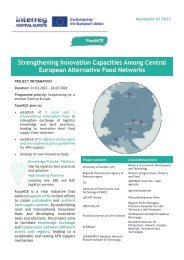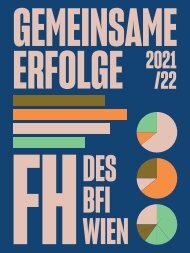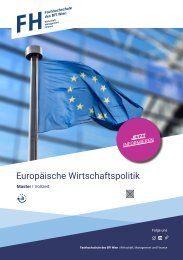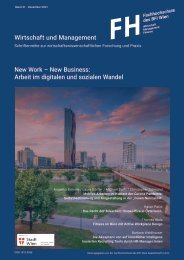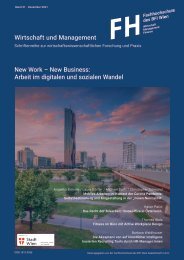The EU, the EEU, and the War in Ukraine: Political Risks and Management Options
This special issue entitled “The EU, the EEU, and the War in Ukraine: Political Risks and Management Options” is published within the framework of the Jean Monnet Network project “The EU and the EEU: Between Conflict and Competition, Convergence and Cooperation” (EUCON). The aim of this project co-funded by the Erasmus+ programme is to explore the complexity of relations between the European Union and the Eurasian Economic Union.
This special issue entitled “The EU, the EEU, and the War in Ukraine: Political Risks and Management Options” is published within the framework of the Jean Monnet Network project “The EU and the EEU: Between Conflict and Competition, Convergence and Cooperation” (EUCON). The aim of this project co-funded by the Erasmus+ programme is to explore the complexity of relations between the European Union and the Eurasian Economic Union.
- No tags were found...
You also want an ePaper? Increase the reach of your titles
YUMPU automatically turns print PDFs into web optimized ePapers that Google loves.
Florence Ertel / Julian Plottka<br />
new authoritarianism <strong>in</strong> Uzbekistan (Schieck 2017). He argues that authoritarian systems can<br />
no longer rely on repression alone but need additional sources of legitimacy. As under current<br />
circumstances <strong>the</strong> Kazakh president cannot generate additional legitimacy by <strong>in</strong>creas<strong>in</strong>g <strong>the</strong><br />
<strong>in</strong>come levels of <strong>the</strong> most disadvantaged citizens, he <strong>in</strong>creases political participation rights <strong>in</strong>stead.<br />
As <strong>the</strong>se reforms do not mark <strong>the</strong> beg<strong>in</strong>n<strong>in</strong>g of democratic transition <strong>in</strong> Kazakhstan, <strong>the</strong>y<br />
are highly unlikely to result <strong>in</strong> additional stability.<br />
Kazakh relations with Russia are a fur<strong>the</strong>r potential source of <strong>in</strong>stability. <strong>The</strong> deployment of<br />
CSTO troops <strong>in</strong> Kazakhstan <strong>and</strong> Russia’s nationalist rhetoric are fuell<strong>in</strong>g fears among ethnic<br />
Kazakhs that Russia could also <strong>in</strong>tervene <strong>in</strong> <strong>the</strong>ir country. Tokayev’s response of ma<strong>in</strong>ta<strong>in</strong><strong>in</strong>g an<br />
<strong>in</strong>dependent Kazakh position regard<strong>in</strong>g <strong>the</strong> war <strong>in</strong> Ukra<strong>in</strong>e has earned him support <strong>in</strong> Kazakhstan<br />
<strong>and</strong> helped dispel <strong>the</strong> reputation of hav<strong>in</strong>g h<strong>and</strong>ed <strong>the</strong> country over to Russia. However, pursu<strong>in</strong>g<br />
this traditional multi-vector foreign policy <strong>in</strong>creases tensions with Russia. Under <strong>the</strong>se circumstances,<br />
balanc<strong>in</strong>g external actors is becom<strong>in</strong>g <strong>in</strong>creas<strong>in</strong>gly difficult for <strong>the</strong> Kazakh government.<br />
6 Literature<br />
Ambrosio, Thomas / Lange, William A. (2014): Mapp<strong>in</strong>g Kazakhstan’s geopolitical code: an<br />
analysis of Nazarbayev’s presidential addresses, 1997–2014. In: Eurasian Geography <strong>and</strong><br />
Economics, 55 (5), 537-559. https://www.t<strong>and</strong>fonl<strong>in</strong>e.com/doi/abs/10.1080/15387216.2015.<br />
1024272?journalCode=rege20 (15.08.2022).<br />
Böttger, Kar<strong>in</strong> / Braun, Yvonne / Plottka, Julian (2019): Die <strong>EU</strong>-Zentralasienstrategie 2019 – mehr<br />
H<strong>and</strong>lungsrahmen als strategisches Dokument. In: Integration, 42 (4), 297-320. https://www.<br />
nomos-elibrary.de/10.5771/0720-5120-2019-4-297.pdf?download_full_pdf=1 (15.08.2022).<br />
Braun, Yvonne / Plottka, Julian / Smirnova, Ekater<strong>in</strong>a (2021): Young Central Asia. Recommendations<br />
to <strong>the</strong> German Government for <strong>the</strong> Implementation of <strong>the</strong> <strong>EU</strong>-Central Asia Strategy.<br />
IEP Research Paper, No 01/21, 7-10. http://archiv.iep-berl<strong>in</strong>.de/wp-content/uploads/2021/03/<br />
Young-Central-Asia-Recommendations-to-<strong>the</strong>-German-Government-for-<strong>the</strong>-Implementation-<br />
of-<strong>the</strong>-<strong>EU</strong>-Central-Asia-Strategy.pdf?it=wp-content/uploads/2021/03/Young-Central-Asia-<br />
Recommendations-to-<strong>the</strong>-German-Government-for-<strong>the</strong>-Implementation-of-<strong>the</strong>-<strong>EU</strong>-Central-<br />
Asia-Strategy.pdf (15.08.2022).<br />
Carnegie Endowment for International Peace (2022): After Ukra<strong>in</strong>e, Is Kazakhstan Next <strong>in</strong> <strong>the</strong><br />
Kreml<strong>in</strong>’s Sights?. https://carnegieendowment.org/eurasia<strong>in</strong>sight/87652 (15.08.2022).<br />
Cornell, Svante E. (2022): Learn<strong>in</strong>g from Kazakhstan’s January Crisis. In: <strong>The</strong> Central Asia-<br />
Caucasus Analyst, 18.04.2022, 5. https://www.isdp.eu/content/uploads/2022/04/220418-FT-<br />
Kazakhstan.pdf (15.08.2022).<br />
32 Wirtschaft und <strong>Management</strong> · B<strong>and</strong> 33 · März 2023








